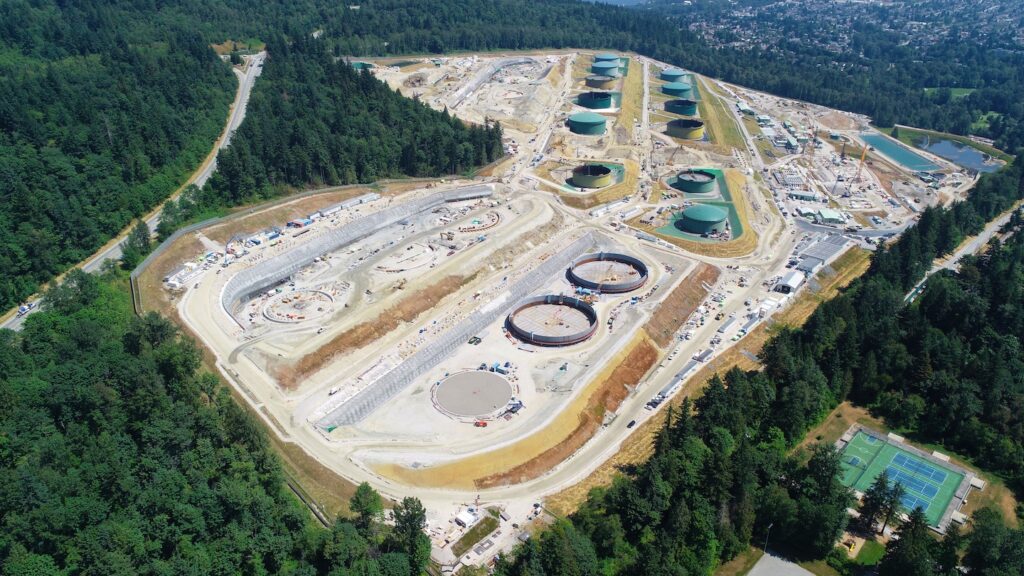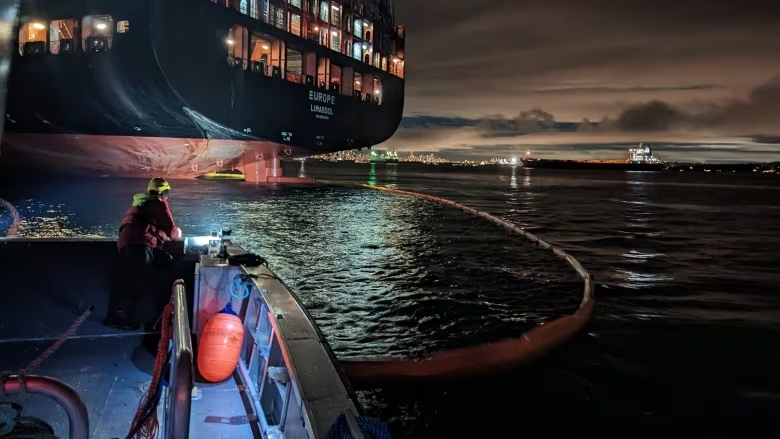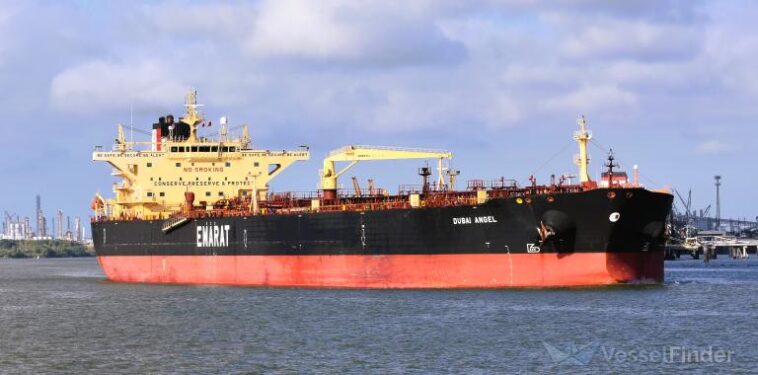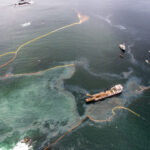After much controversy, delays and sky-rocketing budgets, the $34 billion Trans Mountain pipeline sent its first tanker load of Alberta crude from the pipeline terminus in Burrard Inlet to China on May 22, 2024. The vessel, dubbed ‘Dubai Angel,’ was loaded with 550,000 barrels of diluted bitumen that was piped to the BC coast from Alberta’s oil sands.
With the launch of the new taxpayer-funded bitumen pipeline, tanker traffic is expected to increase sevenfold on the province’s coast. Peak oil tanker traffic through the confined waters of our inner coast could reach nearly a million barrels a day. Yet environmental experts are raising the alarm – they argue BC is not adequately prepared for the eventuality of a major oil spill on our coast.
Last month, in an open letter to George Heyman, Minister of Environment and Climate Change Strategy, high-profile politicians and environmental advocates drew attention to the lack of safety measures in place if an oil spill catastrophe occurred in the Salish Sea near the mainland or Vancouver Island.

A human health assessment of Trans Mountain’s operations, backed by the BC Environmental Assessment Office (BC EAO), states that local health authorities are responsible for coordinating all necessary emergency response tasks. However, those same health authorities are now saying that they are drastically underprepared for such a catastrophe.
The letter adds that “clarification of responsibilities and processes for these life-saving tasks, what resources are required and who has the capacity for the work, has not been established.”
Signatories include the Mayor of Burnaby, City Councillors from several municipalities including Vancouver, Burnaby, District of Metchosin, former Vancouver Mayor Gregor Robinson, and numerous environmental, Indigenous and health organizations, including Canadian Association of Physicians for the Environment and Union of BC Indian Chiefs.
No Evacuation Plan
According to the letter, if an Aframax tanker like Dubai Angel, carrying 600,000 barrels of diluted bitumen, spilled two-thirds of its load and only 0.5% reached shore, over 25,000 people would require immediate evacuation, while 105,000 would need to evacuate if the toxic, highly flammable cargo ignited. Physical and mental health damages would be immense for years to come, to say nothing of the impacts on our coastal waters, beaches, and marine life.
“The health authorities responsible for public health… are also very concerned. They are where the buck stops, and they will tell you they’re not prepared.”
Dr Tim Takaro, Professor Emeritus and Physician-Scientist in the Faculty of Health Sciences at Simon Fraser University
“There is no plan to evacuate 100,000 people from Vancouver,” said Dr Tim Takaro, Professor Emeritus and Physician-Scientist in the Faculty of Health Sciences at Simon Fraser University, in an interview with West Coast Now. Takaro has been an outspoken critic about the province’s lack of adequate monitoring and measures for public health as our fossil fuel projects rapidly expand.
“There is no plan to protect the people with asthma or the people with chronic obstructive pulmonary disease, who will be immediately impacted,” he said, adding that any plume from fire, or the oil plume itself within the water, will be highly volatile, toxic, and unpredictable.
“There’s a big difference between capturing what they estimate will be possible to capture – between five and 15% of the spill – and protecting people and the environment,” Dr. Takaro explained. “The health authorities responsible for public health… are also very concerned. They are where the buck stops, and they will tell you they’re not prepared,” he said.
The letter signatories further demand that “no additional Trans Mountain tankers be allowed through the First and Second Narrows in Vancouver until there is a credible plan to protect the health and safety of people in the region from the elevated risk of a Trans Mountain pipeline oil spill.”
Dr. Takaro notes public health experts are very concerned about the possibility that a tanker ship with oil could hit a Burrard Inlet bridge, like the shipping container that brought down a Baltimore bridge recently, or that a tanker could be hit by a loose barge, since there have already been two incidents of loose barges in the past three years in Vancouver’s English Bay alone.
Tanker Bans
Dr. Takaro praises the north coast tanker ban, which just marked its five year anniversary, as a measure to protect populations and our coastal waters. The Oil Tanker Moratorium Act (Bill C-48), which was heavily supported by regional First Nations and environmental advocates, passed in June 2019 and prohibits tankers carrying more than 12,500 metric tonnes of oil from docking along BC’s north coast.
“From a planetary health standpoint, the ban is very important,” he argued. “We just have to think back to the Exxon-Valdez and the devastation that was caused,” referring to the 1989 oil spill, the second largest in US history that dumped 37,000 tonnes of oil off Alaska’s coast, contaminated the marine environment, and killed untold numbers of seabirds, fish, and whales. “A similar spill could easily happen on BC’s north coast,” he said.
“I think a total ban on the coast is reasonable at the very least to protect the millions of people who live right on the water.”
Dr Tim Takaro, Professor Emeritus and Physician-Scientist in the Faculty of Health Sciences at Simon Fraser University
Earlier this year, both Sooke and Metchosin City Councils campaigned for a tanker ban during stormy weather conditions when existing spill response teams are unable to operate off Vancouver Island’s coast. Their proposal included a request for additional resources for spill response, including equipment, enhanced community evacuation plans, and shoreline response strategies.
Dr. Takaro would like to see the BC government go even further and impose an immediate ban on toxic diluted bitumen traffic through the population centers off BC’s coast. “I think a total ban on the coast is reasonable at the very least to protect the millions of people who live right on the water,” he said.
“We are not adequately prepared for such an event because [officials] are pretending like it’s not a problem,” he added.

In response to these concerns, Minister Heyman said to the Vancouver Sun that the government is currently working with federal officials on an expanded health risk assessment in the event of a catastrophic oil spill.
“This report will allow BC to ensure it is doing everything within our jurisdiction to protect people and to continue to advocate to the federal government to ensure there are robust marine spill and response plans in place, and the resources to implement them,” Minister Heyman said in the statement.
Neither Minister Heyman nor the Province has said when this report would be published, or if new safety protocols would be implemented, much less whether they would fund more adequate emergency response and evacuation measures.







